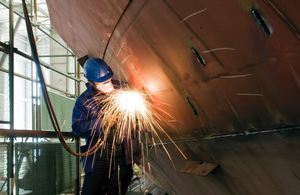Review of tariff quotas on steel from developing countries
The Trade Remedies Authority (TRA) is expanding the scope of its Tariff Rate Quota (TRQ) review on steel products which are imported into the UK from over 120 developing countries.

Widening the scope of the review
Following a request by British industry, the TRA will look at developing country exceptions on rebar, one of the categories of steel covered by the UK’s steel safeguard measure. To make the review more efficient, the TRA consulted industry on widening the scope. The TRA’s review will now consider the developing country exceptions that apply to all steel categories covered by the measure. This will bring forward the TRA’s planned annual review of developing country exceptions to ensure businesses can more quickly benefit from any changes which are needed to the tariffs. The existing quotas were set in July 2022.
Imports from some developing countries may be exceeding 3% of total UK imports
Tariff rate quotas (TRQs) are part of the World Trade Organization (WTO) framework. They specify how much of a product can be imported from a country before its imports are subject to higher tariffs. Imports from developing countries are given exceptions to these TRQs if the goods imported are less than 3% of the total imports of that product and if, collectively, these low volume exporters account for no more than 9% of the total imports of that product. Members of the WTO are responsible for managing their own developing country exceptions to TRQs.
The TRA will assess whether the exceptions for imports from developing countries need to be amended based on updated import data. The TRA’s assessment will now consider imports of all steel categories covered by the steel safeguard measure and from all developing countries, including countries which are currently excepted from the measure and those which are not.
Have your say on the review
If you think your business will be affected by this review (for example, if you import steel products covered by the safeguard measure from a developing country), you can register your interest in the case on the TRA’s online case platform before 27 February 2023. On the public file for this review, you can check the list of product codes affected and the list of developing countries.
Once the TRA has completed its review, its recommendations for any changes to quotas will be submitted to the Secretary of State for Business and Trade, who will make the final decision based on the TRA’s recommendation. If revisions to the TRQs are required, these will be provided in a notice published by the Department for Business and Trade.
Background information
- The UK’s Trade Remedies Authority is the UK body that investigates whether trade remedies measures are needed to counter unfair international trade practices and unforeseen surges of imports in order to protect UK industries. The TRA follows WTO rules and has the power to investigate imports if it thinks they may need to be countered using a trade remedy measure applied at the border.
- Trade remedy investigations were carried out by the EU Commission on the UK’s behalf until the UK left the EU. A number of EU trade remedies measures of interest to UK producers were carried across into UK law when the UK left the EU and the TRA needs to review each one to check if it is suitable for UK needs.
- Safeguard measures temporarily restrict imports of specified goods to help domestic industries adapt to changes in market conditions. They are one of the three types of trade remedies – along with anti-dumping measures which counter goods being dumped in countries at prices below their normal price in their country of origin and countervailing measures against subsidies – that are allowed under World Trade Organisation (WTO) rules.
- Tariff rate quota reviews look at the levels at which tariff rate quotas are set for imports from individual countries. They are usually carried out when there are indications that there has been a change in circumstances since the TRQ was originally applied. The regulations defining how changes of circumstances can be considered in a TRQ review are set out in the Trade Remedies (Increase in Imports Causing Serious Injury to UK Producers) (EU Exit) Regulations 2019, Regulation 35B(9).
- The TRA will review the goods imported to the UK from each of the developing countries which are subject to the steel safeguard measure. If the TRA establishes that imports from a developing country have increased, taking the country’s imports above the 3% threshold for exception from the measure, it can recommend that imports from that country are now subject to the measure. This will mean that imports from that country will be subject to the TRQ residual quota which defines how much importers can bring in before paying higher tariffs, or to a quota specific to that country.
- The TRA can also recommend that a developing country which was previously within scope of the safeguard measure should now be excepted if its imports have dropped below 3% of total imports of the product entering the UK.